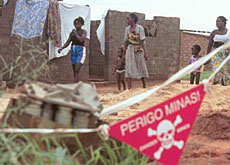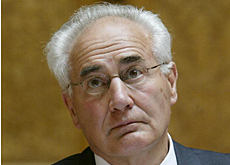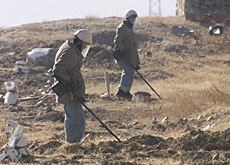Donations hit by charity scandals

In the wake of scandals over the mishandling of funds by three Swiss charities, potential donors are becoming more wary of dipping their hands into their pockets.
Concerned that donations will dry up, some charitable organisations are calling for tighter regulation.
Over the past month, several charities – People Against Landmines, the Swiss Paraplegic Foundation and Swiss Aid for Mountain Farmers – have all been accused of misusing, and in some cases embezzling, funds.
Since reports on the three organisations emerged in the media, Swiss charity Caritas has recorded an increase in calls from would-be donors asking how it spends its money.
“I think it’s a concern for people. People often ask about our administration costs and how much money goes directly to the field,” Caritas’s André Simonazzi told swissinfo.
He added that allegations of this kind risked giving the charitable sector as a whole a bad name.
Seal of approval
Caritas is perhaps one of the organisations least likely to suffer from this latest scepticism among donors. It holds a “seal of approval” by the Zewo foundation, an independent body that regularly checks its members for transparency.
To get Zewo’s seal of approval, charities must fulfil certain criteria, such as proving they carry out their work in a cost-efficient and wholly transparent way.
The seal is not compulsory, and charities wishing to have one must pay a proportion of their income to get it.
Some groups now say there should be a compulsory system of approval in place, and are concerned that the recent scandals have shown the weaknesses in a system where any organisation can set up a charity and appeal for donations.
“If you have many big organisations not belonging to the foundation it can break the market,” Simonazzi said.
“We think people shouldn’t donate if the organisation doesn’t have this label.”
But Zewo head Erich Müller says although the recent allegations of fund mishandling are a concern, charities should not be forced to seek the seal of approval as some smaller organisations would not be able to afford it.
“There are charities which don’t ask for the seal but work very well. The seal does cost money, so each organisation has to ask themselves if it is worth them having the seal.”
String of scandals
At the end of June, allegations surfaced that the director of People Against Landmines had misused millions of francs intended for use in Africa.
Then, in July, a Basel court found doctor and parliamentarian Guido Zäch guilty of mismanaging SFr29.4 million ($21.8 million) belonging to the Swiss Paraplegic Foundation – a charity he heads.
A third report to rock Switzerland’s charity sector came on July 20, when claims emerged that Swiss Aid for Mountain Farmers had lost SFr16 million in bad investments over the past two years.
The charity responded by appointing a new managing director in a bid to tighten up its financial activities.
swissinfo, Ramsey Zarifeh and Joanne Shields
To receive Zewo’s seal of approval, charities must:
Prove that the purpose of their organisation is 100 per cent charitable;
Carry out their work in a proficient, economical and sustainable way;
Have a strict separation between the deciding board and the management;
Guarantee full transparency.

In compliance with the JTI standards
More: SWI swissinfo.ch certified by the Journalism Trust Initiative


You can find an overview of ongoing debates with our journalists here. Please join us!
If you want to start a conversation about a topic raised in this article or want to report factual errors, email us at english@swissinfo.ch.